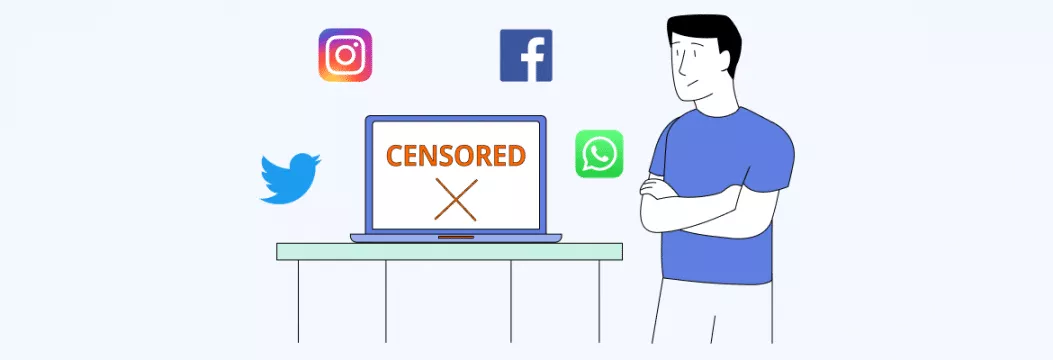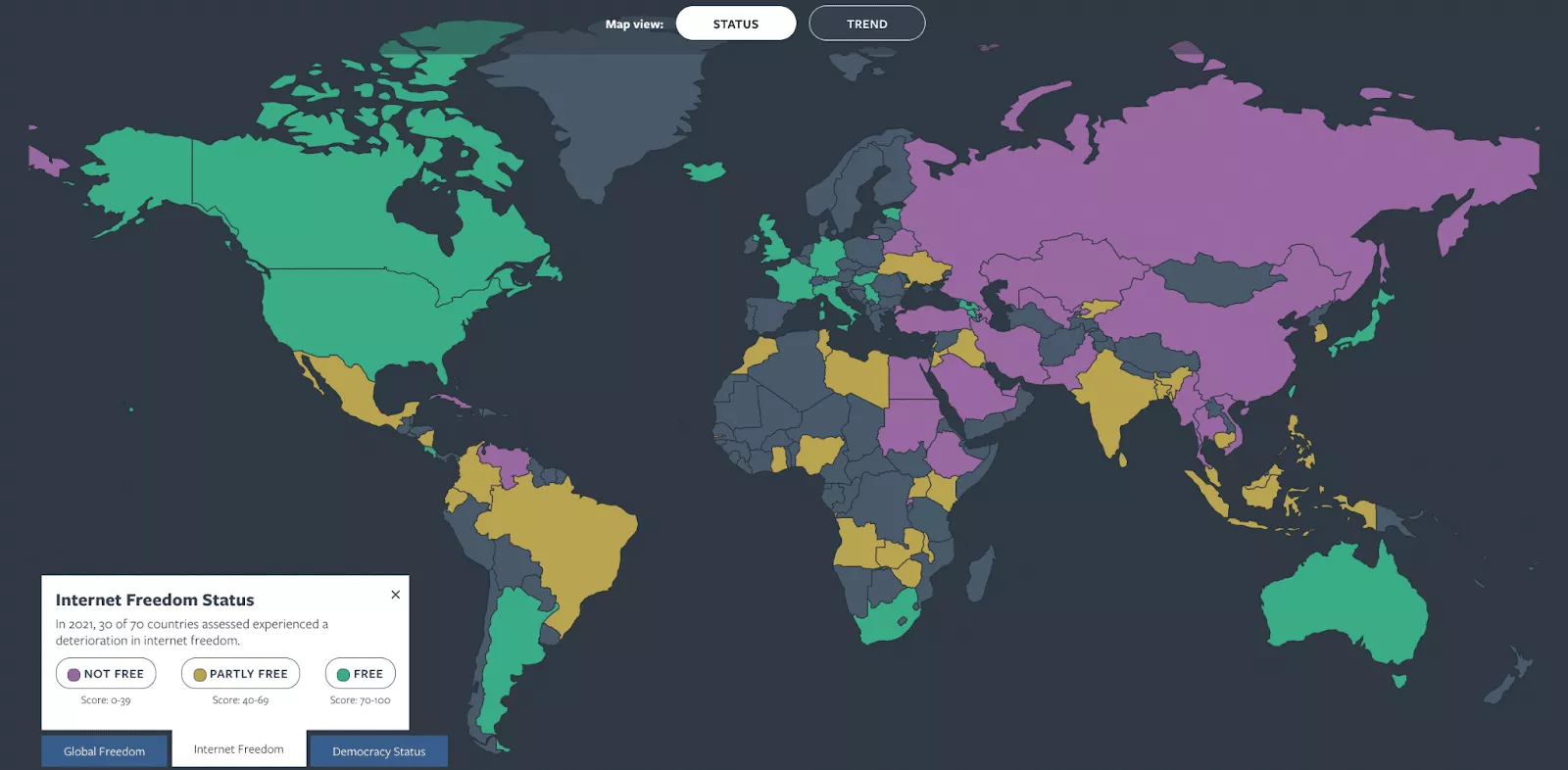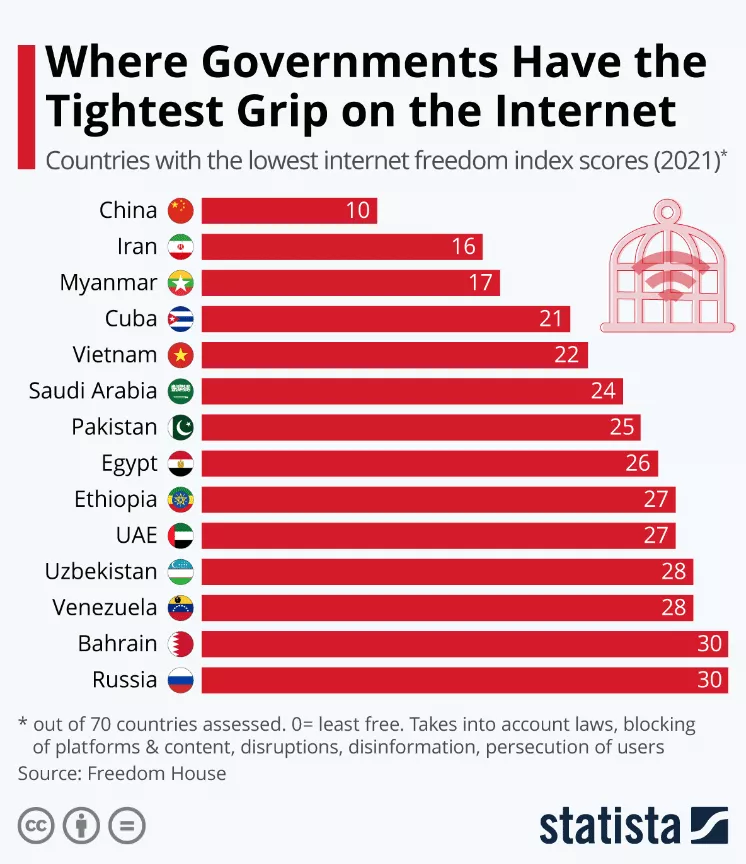Anti Censorship VPN: How to Regain Your Access to the Free Internet
The Internet gives freedom. You can stream any content you want, communicate via social networks, read news on trustworthy websites, and enjoy limitless access to information. Right? If this seems too good to be true for you, you probably know about Internet censorship. And, even if you don’t live in a country ruled by a totalitarian government, you may have experienced certain limitations on your online freedom.
So is Big Brother watching when you go online? And can an Anti Censorship VPN help bypass Internet censorship? Read along to find answers.

What is Internet censorship?
Internet censorship is a form of control over people’s access to online content by setting limits on what they can view or publish online. Censorship Internet access regulation can be imposed by government or private companies to ban certain websites, block technologies, or disallow receiving specific information.

Souce: Google Trends
Nowadays, online freedom is one of the hottest topics. And even though it’s more common for countries with totalitarian or authoritarian governments, various forms and degrees of Internet limitations also occur in liberal democracies like the USA and Australia. According to Google Trends, people in these countries are even more concerned about their online freedom than the citizens of totalitarian states.
What are the reasons for Internet censorship?
There are various reasons for preventing access to social networks, messaging apps, and websites. In many cases, they are quite clear and reasonable; for instance, some regulations restrict access to violent videos, hate speeches, and other dangerous or illegitimate content.
However, governments often use censorship to control media and telecommunications, limiting human rights like freedom of expression. As a result, people living in countries with a high level of censorship strive for more freedom when surfing the web.
How does Internet censorship work?
When establishing Internet censorship, governments and other organizations use several techniques that limit people’s access to specific websites, apps, and technologies. Here are the most common ones:
- Blocking IP addresses. If a website is censored, your Internet service provider (ISP) will block your attempts to access its IP address. Once you try to enter, your Internet connection will disappear.
- Filtering keywords. ISPs block access to URLs and IP addresses that contain restricted content determined with the help of specific keywords.
- Changing DNS (Domain Name System). The users’ access to censored websites can be blocked by altering thedomain names of URLs. As a result, when trying to enter a banned site, you will be redirected to another web page.
- Examining data with deep packet inspection. This approach allows censors to inspect data coming to the users’ IPs through the network and limit access to certain content.
- Blocking Internet traffic ports. Your access to particular sites and web apps can be denied if your ISP blocks ports through which Internet traffic moves.
Where is the highest level of Internet censorship?
As mentioned above, many countries with totalitarian regimes limit their citizens’ access to content. According to Freedom House, the most critical indicators reflecting the state of online freedom are:
- Limited access to social media platforms
- Blocked websites
- Internet shutdown
- Promotion of pro-government commentators
- Existing or new censorship and surveillance laws
- Arrests, imprisonments, or physical assaults of Internet users
- Technical attacks
Based on the collected data, the organization provides a map that reflects the current state of Internet censorship globally.

Source: Freedom House
So what are the countries with the most disturbing Internet censorship trends? Statista reports that the lowest online freedom is in China, Iran, Myanmar, Cuba, and Vietnam. Some countries like China, Iran, and North Korea, use a so-called Great Firewall to control the entire Internet traffic going into and out of the state.

Source: Statista
Now, let’s take a closer look at some examples of countries that establish a high level of Internet censorship.
Saudi Arabia
The quality of Internet traffic in Saudi Arabia is quite high. However, the freedom of users is subject to many limitations, which have religious, moral, social, and political reasons behind them.
North Korea
The only form of the Internet you can access in North Korea is Kwangmyong. It’s the country’s national network consisting of between 1,000 and 5,000 websites. Big social media like Facebook and Twitter, as well as multiple news sites, are banned in North Korea.
China
According to statistics, China has the tightest control over the Internet worldwide. The citizens cannot access Google, YouTube, Facebook, and other popular online platforms. A Great Firewall limits access to any censored content. Also, the government strictly monitors the users’ online activity.
Turkmenistan
In this country, many popular streaming services and web applications like WhatsApp, Zoom, Telegram, and Facebook Messenger, are banned. Even Wikipedia and GitHub are censored. Mostly, Internet shutdowns in Turkmenistan are due to political reasons.
Russia
In recent years, the Russian government has blocked access to many websites and online resources, from LinkedIn and WeChat to Facebook, Instagram, and Twitter. Majorly, it’s done to influence public opinion and avoid anti-Kremlin criticism.
Iran
In Iran, the government justifies all Internet restrictions by protecting morality and religion. In this country, people don’t have access to multiple social networking platforms and websites. There also have been several cases of Internet blackouts and users’ arrests.
What kind of content is usually censored?
Sometimes, Internet censorship might be applied to specific content that is considered unacceptable, dangerous, or inappropriate. For that reason, in many countries, governments ban websites, apps, and social networks, limiting access to information and restricting citizens’ freedoms.
Let’s look at the most common examples of online censorship worldwide.
Social media platforms
In some countries, big social networking platforms like Facebook, Instagram, and Twitter are censored. The most common reason for such censorship is claimed to be a matter of national security. However, the actual purpose could be:
- To prevent people from accessing politically unfavorable information
- To disallow people to share content opposing the government’s policy
- To restrict freedom of speech
- To avoid protests organized via social media
Certain limitations might be applied not only by governments, but also by social networks and search engines like Google, Facebook, and Twitter. These companies struggle with the problem of limiting certain content considered extremist and unacceptable. At the same time, they promote the freedom of expression principles, which often causes inconsistency.
Messaging apps
Popular messaging apps like WhatsApp, Skype, and Telegram, are becoming a more typical target for censorship. According to a Freedom House study, that’s because such apps can spread information and connect users quickly and securely. As a result, it’s getting much harder for authorities to control the citizens’ activities and conduct surveillance.
The most common reasons for limiting users’ access to messaging apps are:
- To prevent people from using means of communication with enhanced encryption
- To avoid rapid and free distribution of information, in particular images and videos
At the same time, some governments can use specific technologies to spy on people’s phones by monitoring their messaging apps.
Video sharing platforms like YouTube
Similar to social networks and messaging tools, YouTube is banned in many countries due to political and social reasons. Also, some of the videos may be inaccessible in particular regions. Nowadays, YouTube is censored in China, North Korea, Iran, Eritrea, South Sudan, and Turkmenistan.
YouTube from its side censors specific content, and it’s not always reasonable. YouTube bans are often directed against various videos, from gun demonstrations to LGBTQ+ content and even conspiracy theorists.
Unacceptable websites
Today, many websites are blocked since they contain content that is not appropriate for particular audience groups. They may also promote extremism, terrorism, hate, and discrimination. However, in many cases, content is blocked due to more complex (and sometimes unfair) reasons.
Let’s look at the types of websites that are often censored in more detail.
Human rights websites
Resources like Amnesty International, Reporters Without Borders, and Women for Women’s Human Rights, are designed to defend human rights and freedoms worldwide. However, they often become a target of restrictions. As a result, people living in totalitarian countries cannot access information on how to protect themselves and bypass censorship websites.
Foreign news websites
Getting unbiased news from foreign sources like BBC News, CNN, Wall Street Journal, or The Associated Press is a challenging goal if their websites are banned in your country. However, totalitarian governments often tolerate only local commentators engaged in propaganda.
Streaming services
Netflix, Apple Music, Prime Video, Disney+, Spotify, and other popular streaming platforms are also fully or partially censored in many countries. For example, many Netflix shows accessible in the USA or Australia cannot be streamed in Turkey or India. Why? Because local council regulations consider certain episodes or even entire series unacceptable.
Solutions for bypassing Internet censorship
Many people, especially those living in countries with tight Internet restrictions, strive to find methods that allow for bypassing Internet censorship sites and accessing the content they need. Fortunately, multiple tools allow for more freedom when surfing the web.
Let’s look at the most common anti-censorship tools and their key specifics that offer an unrestricted Internet access.
1. Tor
Tor (The Onion Router) is a secure online network that can be used as an Internet browser. It encrypts data through several layers and then delivers it through multiple servers. It makes your browsing experience relatively safe and anonymous. However, Tor slows down the Internet connection. Also, it doesn’t provide access to web apps like Twitter, Facebook, and Zoom.
2. Browser extensions
Many people use browser extensions or built-in VPNs to access the needed content. However, with some free options, your Internet security may be compromised.
3. VPS hosting
VPS (Virtual Private Server) is a cloud-based solution providing access to virtualized server resources. Normally, such services are delivered by cloud or hosting providers. However, this solution might not be suitable for private usage since a VPS is difficult to install and maintain.
4. Proxy servers
You can connect to a proxy server to browse and stream media from an anonymous IP address. Proxies are easy to use, but they also slow down your Internet and can be unsafe.
5. VPN services
Similar to a proxy server, a VPN alters your IP address and encrypts your data. With a trustworthy service provider like VeePN, you can access content with no limits while keeping your online security and privacy at the top level.
What is VPN?
A reliable VPN is a solution to censorship that guarantees greater security and freedom than other options. Let’s take a closer look at what a VPN service is and how it works.
VPN is a powerful technology that ensures a secure connection between your device and the Internet throughout an encrypted tunnel. You can use VPN to bypass Internet censorship that limits your freedoms, keep your data protected from third-party involvement, and stop Internet throttling.
How an anti censorship VPN work?
A VPN creates an encrypted tunnel for your data, changes your actual IP address, and moves it to a remote server. As a result, third parties like your ISP or advertisers cannot interfere with your online activity, monitor your data, and track your current location.
Moreover, reliable VPN services like VeePN ensure your Internet presence is completely secure and anonymous. They use top-notch encryption, powerful servers, and many extra features to protect your personal data and online privacy.
Can you feel safe when using a VPN?
Internet freedom is one of the top concerns nowadays. Censorship implemented by many countries often violates people’s rights and doesn’t allow them to get the information they desire.
However, you can use a VPN to enhance your Internet privacy. This solution will provide access to any content and stop Internet censorship. Journalists, activists, and common citizens of countries, where online freedom is declined, can use different VPN protocols to access blocked websites. With a reliable VPN service, you can freely use trustworthy news resources, secure messaging apps, social media, and other online content.
Please note: laws surrounding VPNs in general and online censorship, in particular, vary by country and region. While it’s perfectly legal to use a VPN in most of the world, some countries have specific bans or restrictions. Please keep in mind to check whether there are any restrictions in your particular country or your particular terms of service before doing anything potentially questionable. Please be informed that if some action is illegal without using a VPN, it will be illegal with its use also.
Looking for a reliable anti-censorship VPN providers to feel more protected and free when surfing the web? VeePN is a powerful solution that gives you more freedom and robust online security. Thanks to advanced AES-256 encryption and the NetGuard feature provided by VeePN, you can be sure nobody will be tracking your online activity.
FAQ
You can avoid censorship and access the information you need by using a reliable VPN solution. VPN can provide more privacy, security, and freedom when surfing the web. This technology encrypts your data and alters your IP address, so your browsing activity will be completely anonymous. Read this post to learn more about using VPN to protect your online privacy and get access to various content.
VeePN is freedom
Download VeePN Client for All Platforms
Enjoy a smooth VPN experience anywhere, anytime. No matter the device you have — phone or laptop, tablet or router — VeePN’s next-gen data protection and ultra-fast speeds will cover all of them.
Download for PC Download for Mac IOS and Android App
IOS and Android App
Want secure browsing while reading this?
See the difference for yourself - Try VeePN PRO for 3-days for $1, no risk, no pressure.
Start My $1 TrialThen VeePN PRO 1-year plan






